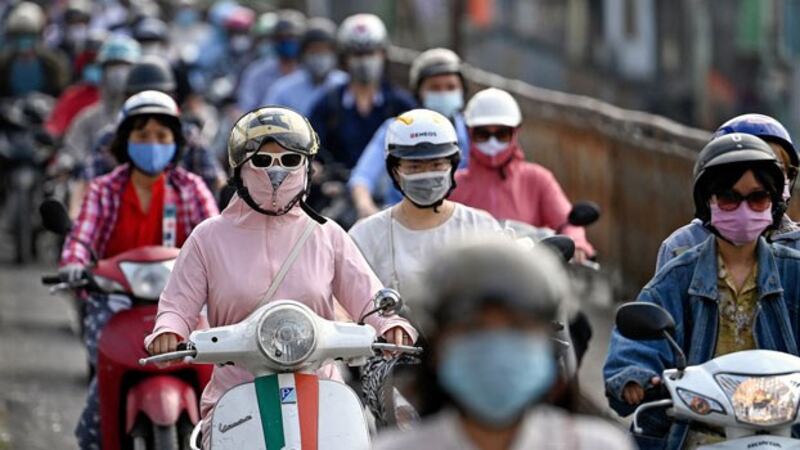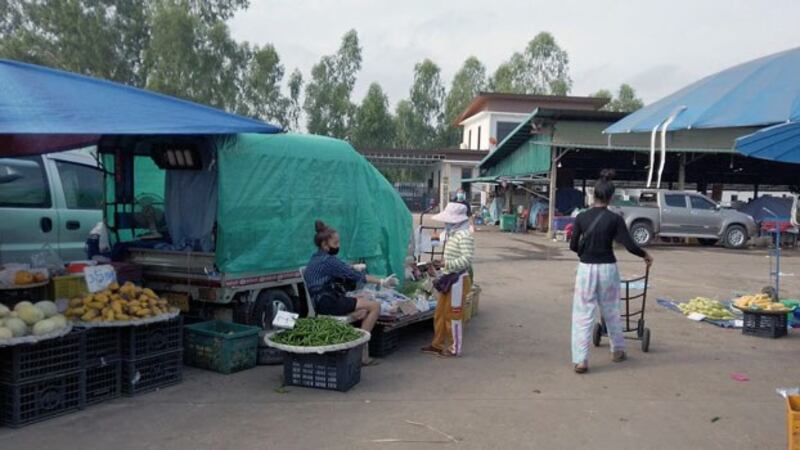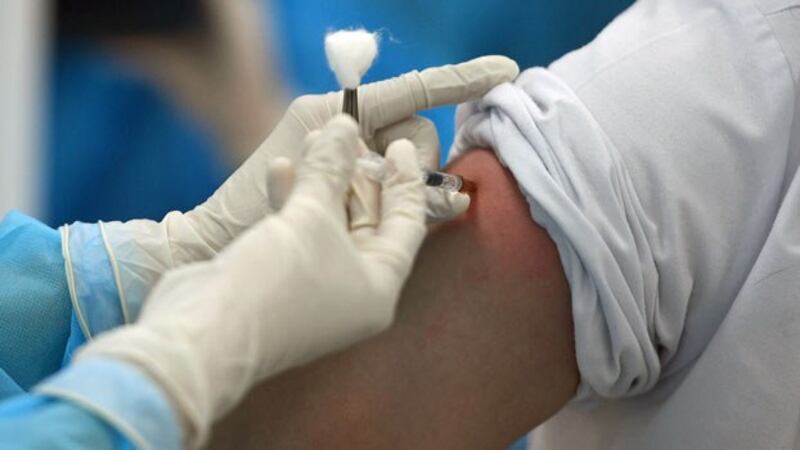The number of confirmed coronavirus cases continued to surge in continental Southeast Asia on Tuesday with a spike in Cambodia prompting the government to threaten legal action against journalists who cover stories in “red zone” areas with strict lockdowns.
Cambodia’s Ministry of Information said local and foreign media coverage of the red zone has “confused the public and provoked social chaos that will lead to more COVID-19 spreading.”
“In order to protect social security and prevent COVID-19 from spreading, the Ministry of Information is advising journalists to halt all actions immediately,” it said in a statement issued Tuesday. “In the event that people continue to ignore this notice, [we] will take legal action.”
Ministry spokesman Meas Sophorn told RFA that journalists who went to “red zone” areas and broadcast live via social media made comments without any medical foundation that might risk the spread of the highly contagious virus. He also said that some reporters chased ambulances during live broadcasts.
“If they comply with the law, then they can continue their work,” he said.
Journalist Leng Det said even though he supports the ministry’s order, he wants the media to work with authorities so reporters can provide accurate news.
“In order to get accurate news, we need many sources,” he said. “We don’t have to chase ambulances and police to tell the news.”
Nop Vy, executive director of the Cambodian Journalists Alliance, said preventing the media from covering news in red zones will not be in villagers’ best interest, and he insisted that those who have received training on reporting on the coronavirus pandemic be allowed to cover news freely.
“I am very concerned that the ministry will completely ban journalists [from covering the red zone],” he said. “So far, journalists have broadcast about food shortages and people’s appeals to get food aid into the red zone. This has shown that journalists have contributed to disseminating news.”
As of Tuesday, the Cambodian government reported 938 new cases and one new death. In all, the country has had 16,299 confirmed cases and 107 deaths.

Virus variants found in Vietnam
Neighboring Vietnam reported 14 new confirmed coronavirus cases on Tuesday, including virus mutant variants found in India and the United Kingdom. In all, the country has reported 2,994 confirmed cases since the pandemic began and 35 deaths.
Genetic sequence analyses using samples from three infected bar workers in Vinh Phuc province indicated that they had the COVID-19 mutant variant found in India, while samples from virus patients from Ha Nam, Hung Yen, and Ha Tinh provinces was that of the United Kingdom variant, said Ministry of Health on Tuesday.
The ministry also reported two new community transmission cases — one in Hanoi and the other in the central city of Danang.
As of Tuesday, about 539,000 people in Vietnam had received vaccines, mostly health care workers, central and local level members of the country’s Steering Committee for COVID-19 Prevention and Control, and police and military forces.
The Pasteur Institute in Ho Chi Minh City said that about 100 local reporters who cover the COVID-19 pandemic in the city also had been vaccinated.
Vietnam on Tuesday sent 35 medical experts, 200 ventilators, U.S. $500,000 in cash, 10 tones of antiseptics, and two million face masks to neighboring Communist ally Laos, according to Lao media.
The country recorded 60 new COVID-19 cases overnight, bringing the total to 1,026. Laos has not yet registered any virus-related deaths.
China also sent 25 health care workers to the capital Vientiane on Tuesday, China Radio International reported, as Laos struggles to contain a spike in virus cases.
“Today we found 60 more cases of COVID-19 infections among 1,463 samples,” said Dr. Phonepaseuth Xayamoungkhoun, deputy director of the Communicable Disease Control Department under the country’s Health Ministry, at a press conference on Tuesday.
Dr, Kikeo Khaykhamphithoune, chairman of the National Taskforce for COVID-19 Prevention and Control, announced at the same event an extension of the lockdown to prevent the spread of the virus.
“The government has decided to extend the lockdown from May 5 to May 20 because the number of COVID-19 cases continues to surge,” he said.

Laos sets up temporary hospitals
The Lao government is setting up three makeshift hospitals with 736 beds in the hard-hit capital Vientiane in anticipation of growing infection rates, a national taskforce member told RFA.
Hospitals in Champassak and Bokeo provinces, which recorded 30 and 20 new cases, respectively, on Tuesday, reported shortages of doctors, nurses, ventilators, medical equipment, and medicine.
Provincial taskforce committees are setting up 400 beds at a finance college in Champassak to address the shortfall, while those in Bokeo are setting up 70 extra beds in a meeting room inside a government administration building, officials said.
“We’ve reported the shortage of equipment to the central government,” said a taskforce committee member from Bokeo.
The current COVID-19 surge is worrisome because the country of 7 million people had recorded only a few cases a day for months, said a World Health Organization (WHO) official in Laos
WHO has an emergency team working with and providing technical assistance to the country’s Health Ministry.
In early April, the Lao government started a national rollout of COVID-19 vaccines for the most vulnerable and at-risk groups through a mass vaccination session at the Mittaphab Hospital, a government teaching medical institution in Vientiane. Following the initiative, vaccines began to be administered at seven central hospitals in the capital and at the provincial level.
More than 294,300 Laotians have received one dose of the COBID-19 vaccine, while more than 73,160 others have received two doses, said Phonepaseuth Xayamoungkhoun.

‘Super spreader’ returned to Laos
On April 30, Thai immigration officials handed over to their Lao counterparts Phavadee Viphakone, dubbed a COVID-19 “super spreader,” according to the Lao national taskforce and a police officer Nong Khai province, Thailand.
“The Lao woman was sent back to Laos to be charged with serious crimes,” said the officers who declined to be named.
The 25-year-old woman had been in contact with two Thai men who illegally crossed the border from Thailand’s Mukdahan province to Laos’ Savannakhet province, where she took them to Vientiane by bus.
Phavadee, her friend Monmina Southida, and the two Thais visited various entertainment venues, including karaoke bars and massage parlors for several days before the Lao New Year on April 15.
Phavadee and the two Thais illegally crossed the border and entered Thailand’s Nong Khai city where they all tested positive for the virus. Authorities detained Monmina, also considered a super spreader, after she was discharged from a hospital where she had received treatment for COVID-19.
After the group infected employees at the entertainment venues they visited, the country’s infection rate began rising, said Col. Saysaming Sivilay of the Lao Immigration Police Department at a press conference on Tuesday.
Phavadee, who is now in quarantine at an undisclosed location for 14 days, will be charged for illegally departing the country, helping foreigners enter Laos illegally, and spreading the virus, he said.
The two Thai nationals are being charged in Thailand, though Lao authorities will request they be handed over to face criminal charges in Laos, he added.
Reported by RFA’s Khmer, Vietnamese, and Lao Services. Translated by Samean Yun, Anna Vu, and Max Avary. Written in English by Roseanne Gerin.
